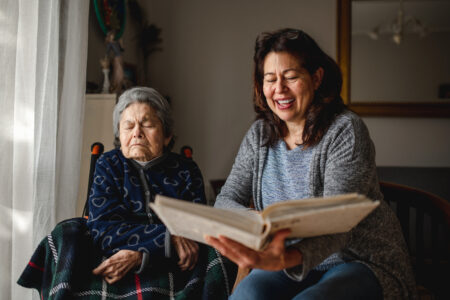
Share On Social!
Researchers are exploring a genetic variant that could explain the higher rates of Alzheimer’s among Latinos living in Puerto Rico.
This work – which is ongoing – could help fill a critical gap in Latino Alzheimer’s research and spark new treatments for dementia, according to researchers at the John P. Hussman Institute for Human Genomics at the University of Miami.
“A genetic target, which drug companies are showing interest in, is twice as likely to be successful therapeutically than nongenetic targets,” Margaret Pericak-Vance, leader of the Hussman Institute, told NBC News.
Let’s dive into the research and how it impacts Latinos!
The Need for Genetic Research on Alzheimer’s among Latinos
Latinos are 1.5 times more likely than their peers to have dementia.
Currently, 13% of Latinos who are 65 or older have Alzheimer’s disease or another form of dementia. By 2030, 40% of Alzheimer’s patients in the U.S. will be Latino or Black.
This population are at risk because of medical conditions – high blood pressure, stroke, and heart disease – that contribute to developing Alzheimer’s.
Genetics are another factor. But genetic studies are not diverse.
Most such studies in Alzheimer’s disease have been performed in non-Latino white populations of European ancestry, with communities of Hispanic and African ancestries largely ignored, according to the Hussman Institute.
That is why the Hussman Institute is taking action.
Starting a Database on Alzheimer’s and Genetic Variations among Latinos
Pericak-Vance of the Hussman Institute has spent years researching Alzheimer’s.
She recently got federal funding to launch a genetic database to stimulate research on Alzheimer’s and genetic variations among people of Latino and African ancestry.
The team will recruit 5,000 people from various African countries, 4,000 African Americans, and 4,000 Latinos. Researchers will collect clinical, phenotypic, and genetic data, along with social determinants of health factors, to create a large genomic study resource.
“These studies will accelerate our understanding of the genetic factors contributing to Alzheimer’s disease, especially in the multi-ancestral population of the United States as well as populations around the world,” said Dr. Jeffery Vance of the Hussman Institute.
The team’s work is already making strides in Puerto Rico.
Identifying Genetic Variants in Puerto Rico
In the United States, 10.7% of the Puerto Rican population age 65 or older have Alzheimer’s disease. In Puerto Rico, 12.5% have Alzheimer’s.
Dr. Katrina Celis, an associate scientist at the Hussman Institute, and Dr. Briseida Feliciano-Astacio, a neurologist and principal investigator from the Universidad Central del Caribe, in Bayamón, Puerto Rico, are collaborating to study Alzheimer’s in Puerto Rico.
They are studying multiplex families, those with more than two or three members who have Alzheimer’s in Puerto Rico.
The team has become the first to identify chromosome 14, a gene variant that most occurs in African ancestry and is largely present in people who have early-onset Alzheimer’s.
“We identified that the particular region that harbors this variant that is associated with Alzheimer’s disease risk lies on the African ancestral background,” Celis told NBC News.
Puerto Rican ancestry is a mix of European, African and Native American or Amerindian.
“However, that particular variant has only been found in Caribbean Hispanic individuals, mainly of Puerto Rican descent, which is known in the genetic world as a founder mutation, meaning something happened on the island after the colonization that created this sort of variant within the genetic information of these individuals.”
Celis is unpacking the molecular mechanisms behind this variant in Puerto Ricans and the “wide range in age of onset that they see in individuals who carry this particular genetic variant,” according to NBC News.
Even with this line of research, one thing is clear – more diverse research is needed.
Latino Participation in Clinical Trials
More research with diverse and minority populations is needed to help researchers better understand how diseases like Alzheimer’s affect Latinos.

But historically, diversity is lacking in clinical trials.
While Latinos comprise 18.9% of the US population, they make up just 10% of participants in clinical trials run by the National Cancer Institute and 4% of drug trials run by the FDA.
The lack of Latino volunteers in clinical trials makes it harder for researchers to find treatments tailored for the population.
Dr. Amelie Ramirez, director of Salud America! at UT Health San Antonio is also helping tackle this issue. She’s creating new ways to encourage Latinos to volunteer for cancer and Alzheimer’s clinical trials, with support from Genentech, a member of the Roche Group.
Ramirez is showcasing open clinical trials and uplifting the stories of Latino clinical trial participants on her Salud America! website.
She’s also raising awareness through social media events and webinars.
“Clinical trials help us fight for our familia,” Ramirez said. “Latinos who volunteer in clinical trials are helping themselves. And they’re also building a future with better treatments that can help their families in the years to come.”
Are you looking for the right clinical trial for you?
Visit the Salud America! clincal trials page and explore different open trials and how you or someone in your family can participate!
By The Numbers
142
Percent
Expected rise in Latino cancer cases in coming years



